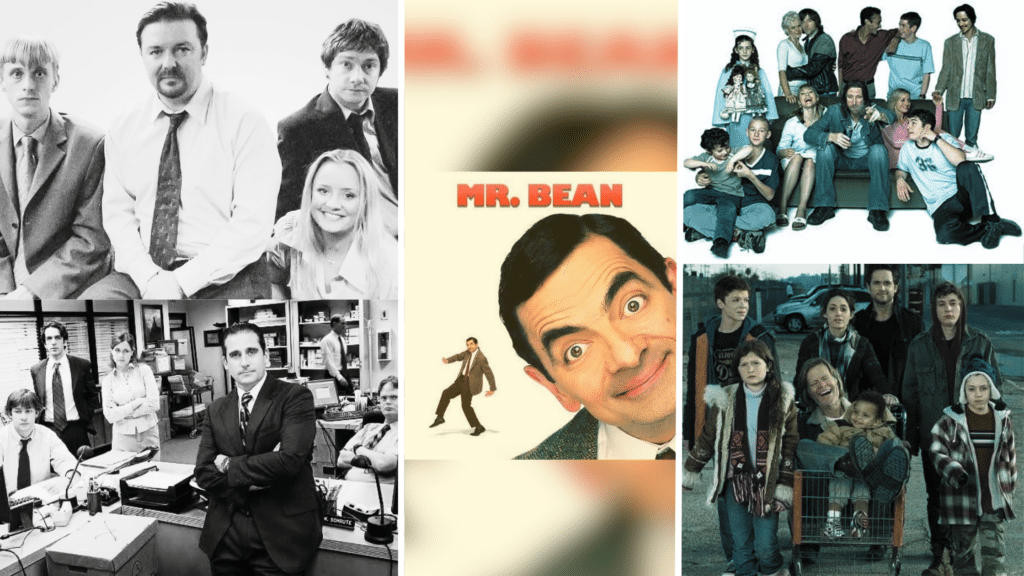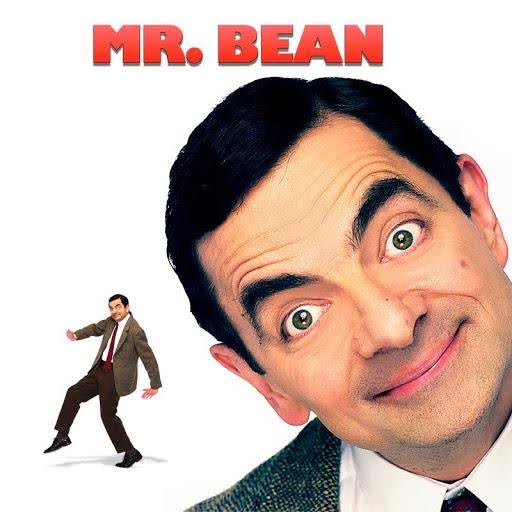
Television is living its best life right now, with hundreds of shows hitting our screens every year. From drama to thriller and comedy, there’s nothing we like better than cozying up on the couch with a bag of popcorn and our favorite streaming service.
In 2023, comedy was the second most on-demand genre, with 41.7% of North American audiences tuning in, only just behind drama. With 91 million US households watching Comedy Central every year, it’s no wonder that comedies are as popular as ever!
Sitcoms are a huge part of the comedy phenomenon. From the 1980s with shows such as Seinfeld and The Simpsons, to more recent hits Superstore and New Girl, audiences keep coming back for more, and not just in the US.
While US comedy is hugely popular in the UK, there are still a select few British comedies that have made the journey across the pond. Shows like The Office, Shameless, Gavin and Stacey, and The Inbetweeners have all been adapted into US productions.
In this article, we’ll not only explore what makes a sitcom tick, but also how comedy differs between the two biggest producers of comedy: the US and UK. We’ll compare the humor, how the stories and characters are adapted, and see who’s really the best at crafting comedy.
Welcome to the Great Sitcom Showdown!
What is a Sitcom?
Before we start facing off our favorite comedies, let’s take a look at what a sitcom actually is. The term sitcom is short for ‘situational comedy’, a sub-genre of comedy which focuses on a set of characters trying to work through strange situations, usually of their own making.
Sitcoms are usually set in one place, for example the Dunder Mifflin Paper Company’s Scranton branch in The Office (US), the New York suburbs in Friends, or the town of Springfield in The Simpsons. Each episode tends to be self-contained, with characters and relationships evolving within a series arc.
Sitcoms highlight the comedy of everyday life and the situations we as humans often find ourselves in (even if we don’t always admit it!). To this end, characters are usually hugely relatable, causing audiences to root for them and be engaged in their journeys.
Before we jump further into our own sitcom journey, if you’d like a breather to take a deep dive into sitcoms, their history and characteristics, check out our dedicated article here.
Sitcoms across the pond: US vs UK versions
We should start our Great Sitcom Showdown with the disclaimer that British and American humor are two different beasts.
Us Brits love sarcasm, and we use it a lot in our day-to-day conversations, which means it of course finds its way into our comedies. We love a bit of mockery and can come across as quite brash both when talking about other people and even ourselves – lots of self-deprecation going on here! Brits love championing an underdog, waiting for disappointment around every corner.
On the other side of that is a love for slapstick and physical humor. Rowan Atkinson’s Mr. Bean is one of Britain’s most recognizable exports. The character Mr. Bean doesn’t speak, but rather mutters and uses exaggerated body movements to tell the story, leaving the audience in stitches.

American comedy is much more optimistic, with a brighter outlook on life. Characters are championed in their exploits, and the humor is more open. Most of the time, they’ll succeed, no matter what happens.
The best way to show the difference is in our first comparison, which is, you guessed it, The Office.
Round 1 – The Office (UK) vs. The Office (US)
The Office (UK) started life on BBC Two in the UK, first airing in 2001. A mockumentary series following the lives of the Wernham Hogg paper company’s employees in the Slough branch. The central character and manager of the branch was the sarcastic and downright unlikeable David Brent, played by writer Ricky Gervais.
The success of the show in the UK soon caught the attention of the US market, and in March 2005, The Office (US) began to air, with a different man at the helm, Michael Scott.
Here’s where the difference between American and British humor started to show. While David Brent’s crass nature worked for the sarcasm-loving UK, it didn’t quite work in the US. This is why we see a character jump for Michael Scott from Season 1 to Season 2.
Knowing your audience is crucial, and here is where The Office (US) had to make drastic changes to remain on the air. Having written the original UK series, it made sense for Ricky Gervais alongside writing partner Steven Merchant to write the US pilot. But Michael Scott didn’t resonate as well with the American viewer as they would have liked, with changes to Michael’s character quickly made for season 2.

Now that both adaptations have concluded, we can see the overarching comparisons. In the original UK version, David Brent’s character doesn’t change, rather the environment around him does, leading to his eventual downfall.
Conversely, in the US version, Michael Scott and the characters around him change for the better. Scott’s redeeming qualities counteract his ignorance and self-centered nature, aligning more with the traditional American approach to comedy.
Another aspect to note here is the length of British comedy series vs. their American counterparts. American series tend to last a lot longer, both with the number of seasons and episodes, allowing for more character development. Another reason why we see more change in the characters in The Office (US) and more consistency in The Office (UK)
The Office is an interesting comparison, with a clear lesson in knowing your audience as a screenwriter. Consider how your target demographic could respond to your characters.
Round 2 – Shameless (UK) vs. Shameless (US)
Another UK export is Shameless, which first hit UK TV screens in 2004. Centered around the mishaps of the Gallagher family, the show took us into a typical British estate. The series was picked up by Showtime in 2011, but has altogether a more dramatic tone than the original.
When we compare UK and US adaptations, it’s important to note the differences in culture and socio-economic circumstances. In Shameless (UK), the Gallaghers are supported by the UK government through welfare benefits, which in turn gives the family less motivation to change. Whereas in Shameless (US), there is no such support, forcing the Gallaghers to find their own opportunities and other ways through their struggles.
This small change allows for huge differences in how the two versions of the show pan out. Like The Office (US), Shameless (US) naturally has more character development, and an underlying will for the family to succeed, supporting buy-in from American audiences.
An example of this is Fiona in Shameless (US), who is constantly close to complete burnout trying to provide for her family. Her British counterpart is only in the show for the first two seasons, leaving to live in Amsterdam with her boyfriend.

Shameless seems to have learned from The Office, with closer attention paid to the audiences. It’s also important to note that broadcasting rules and conventions differ between the US and UK, with Shameless (UK) pushing more boundaries in terms of mature content, with more censored scenes in Shameless (US).
Round 3 – One-Episode Wonder
You may have noticed by now that most adapted shows make the journey from the UK to the US. You won’t find US shows being remade in Britain!
There is much debate over why America is always remaking British productions. Is it the translation of comedic styles? Is it to make more money?
The truth is, us Brits love a US sitcom, and are partial to an American remake. But there have been a number of sitcoms that have made the journey across the pond, and we’re just not sure about them!
A UK comedy staple in the 2000s, The IT Crowd was hoped to follow the same success as the American adaptation of The Office, but it was a prime example of when something ain’t broke, not to fix it. The US pilot features original lines of dialogue word for word, which just don’t sound right in the mouths of actors who didn’t fit the right archetypes for the roles.
While Roy’s character in the show hates his job and is generally pessimistic, Joel McHale’s portrayal in the US pilot was on the upbeat side. While British actor Richard Ayoade reimagined his role as Moss almost identically, the other characters around him just seem to fall flat. It’s no surprise the show was cancelled after the pilot.
The IT Crowd clearly shows us that some series are so deeply rooted in the culture in which they evolved, that it’s almost impossible to reboot elsewhere. Check out the original UK pilot here.
Other examples of where US adaptations failed to hit the mark are The Inbetweeners, Peep Show and The Thick of It.
With British audiences very well accustomed to American culture through the many exports, they are more likely to adapt to American shows without the need to see a British spin. On the other hand, while American audiences have their favorite British shows in their purest form, the temptation to Americanise is always there.
Modern Sitcoms
All the sitcoms we’ve mentioned in this article aren’t very recent. As audiences have continued to develop and change, so have story lines, characters, and themes. Shows like Abbott Elementary, Community, What We Do in The Shadows and Ghosts have done away with laughter tracks and one-sided characters to develop shows that mean more to audiences.
So, why the change? The nature of streaming and the countless streaming services on offer to audiences have forced television studios to rethink how they engage viewers. With more choice, audiences are more likely to switch off and find something else to watch if they aren’t hooked.
Pop culture references, meta-humor and breaking the fourth wall have become all the more common thanks to trailblazing shows such as Arrested Development and Community, where we spend a lot of time with dysfunctional yet relatable characters, in situations that we know all too well, yet exaggerated slightly.
Underneath all modern sitcoms is a moral message. Superstore showed the resolve and value of retail workers, 30 Rock shows us we can go for our dreams despite our circumstances, and Community shows us how we can find ourselves in the most chaotic of places.
Series Finale (AKA, The Conclusion)
In conclusion, sitcoms are like the gift that keeps on giving. From British sarcasm to American optimism, both styles have their quirks, and let’s be honest, we love them for it. Whether you’re rooting for Michael Scott to finally “get it” or cringing at David Brent’s latest blunder, there’s no shortage of laughs on either side of the pond. As new sitcoms evolve and streaming services pile up, one thing’s for sure: our couches aren’t going anywhere, and neither are we—unless the popcorn runs out!
Now I know you’re keen to write a sitcom for yourself, and here at Celtx, we’ve got everything you need to write the next hit show. From idea generation to writing your first draft, Celtx has you covered.
Sign up and start writing today (it’s free!)
You might also like:
- What is Dramatic Irony? Examples & How to Use it
- Laugh Out Loud: How to Write a Comedy Script
- Character Foil: The Secret Ingredient for Dynamic Duos in Screenwriting
